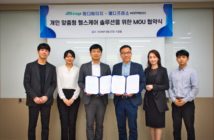
“The VR industry is still in its early stages. Both hardware penetration and content distribution rate show slow pace of growth.” Said Seung Jong Lee, the CEO of SKONEC when attended SKT “True Innovation Meetup” event on last Wednesday. During the meet-up, he held a presentation on the topic of VR and human interaction, explaining the condition to expand the VR industry.
Lee said, “currently, latency and low portability hinder the VR market’s further growth. The VR industry ecosystem consists of C-P-N-D, which are contents, platforms, networks, and devices. Ecosystems under this structure can be big only if they develop in a balanced manner”. He mentioned about the network perspective, showing an expectation by saying “as 5G infrastructure is in full swing recently, we will have a core infrastructure that connects real-time high-capacity data with everything very quickly”.
On the other hand, Lee claimed that ultra-high-speed, ultra-low-latency and hyper connected environment must be improved in order to enjoy immersive media in real time. This means that the industry still has a complaint about the device, such as limitations of wired connection and user motion freedom. Currently, VR devices have been using rotational tracking based 3 degrees of freedom (3DoF) and this can only cover head turning motion in one place. Lee commented “”all-in-one product that doesn’t require separate devices has been released, while the development of 6 degrees of freedom (6DoF) method greatly improved freedom of movement and experience by tracking movements within 10 meters.” He also introduced SKONEC’s multi-player device for 2-4 users and automated device that doesn’t require human management.

Regarding platforms and contents, Lee highlighted the importance of developing products that can be operated at location stores, saying, “content developers tend to avoid investing in new areas due to cost burdens, so they tend to focus on developing online content and platform.” He addressed some examples, which include SKONEC’s VR Arena, VR Room escape and party room idea. All the products are for 2-4 players and have a strength on easy installation and deinstallation. Lee added “We will run VR square based on these devices to provide a new form of theme park and playground for everyone”.
After Lee’s session, presentation focusing on contents followed. Myeong Gyun Choi, the director of PIXELPIMP gave a keynote about the future of VR games in the 5G era. He said the games should highlight real time elements, saying “If you play a swordfight game, the speed, angle, and movement of the opponent and my arm affect the result of the game. In order to make this game work, the opponent and the player’s movements must be communicated. Mouse can function in flat screen, but VR has three-dimensional range of coordinates, making it difficult to deliver sophistication of the past”. Choi also said once the 5G infrastructure is stabilized, all coordinates can be tracked in real time and even can be transferred to other devices though cloud. Moreover, he added theoretically, sending packets once every 0.03 second will be possible. “What really matters in 5G is not a simple speed, but the latency speed. The more interactive the game is, the more users want to communicate with others in a more natural and sophisticated way. This aspect greatly influences the quality of the experience”.
There were other comments about compatibility across devices and platforms. “Rise of the Fallen, the game launched by PIXELPIMP cover most of the VR content platforms including Oculus Go, Neo and Samsung. We are securing multi-user pool across world and maintaining the characters, even after the HMD replacement. We are doing this to make users enjoy the game regardless of different devices and platforms conditions”. Also, VR content production company Thirteenthfloor’s vice president Jun Ho Kim and LOOXID Labs’ Yong Wook Kim gave a case study of experiential media implementation and Emotion Recognition respectively.

Meanwhile, True Innovation is a collaborative project of SK Telecom’s Open Collabo Center. After its establishment, the center has been working with the external partners to support startups and offer incubation program to them. True Innovation has been organizing monthly meet-up event to share in-depth insights about media, drone and the Internet of Things and more.






